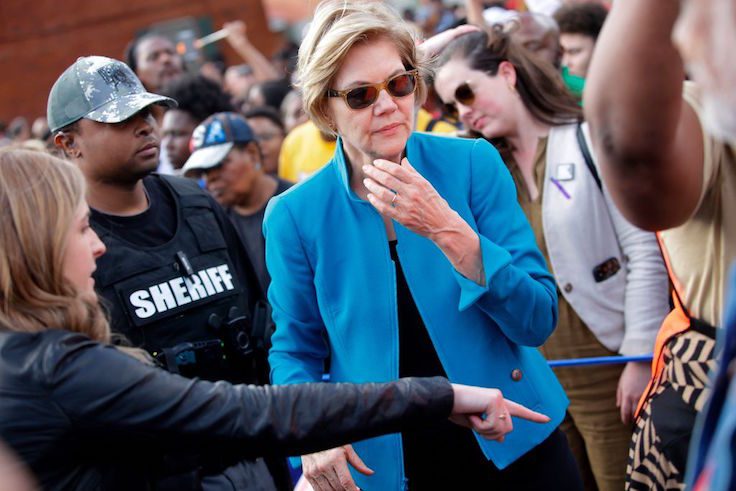No 2020 contender has fallen as hard or as fast as Sen. Elizabeth Warren (D., Mass.).
Once poised to break out of the pack and overtake frontrunner Joe Biden, Warren has seen her support collapse, dropping 12 percentage points from its peak in the RealClearPolitics polling average. She is now behind Michael Bloomberg and was all-but-tied with Pete Buttigieg before the former mayor departed from the race on Sunday. Warren has had an anemic showing in the early primaries, coming in third, fourth, fourth, and finally fifth place in each contest. She currently has just eight delegates, a bit more than 5 percent of the total thus far allocated.
With the departure of both Buttigieg and, on Monday, Sen. Amy Klobuchar (D., Minn.), two questions are left hanging over Warren's head in advance of the Super Tuesday slate of primaries. What happened to her campaign? And why is she still running it? The answer to both is that Warren has positioned herself as a unity candidate—a posture that not only tanked her chances but will likely drive the Democratic Party further apart come the convention in Milwaukee.
There is a chance that Warren will pull out a win in her home state of Massachusetts on Tuesday, but that's far from certain. The latest polling has her tied with national frontrunner Sen. Bernie Sanders (I., Vt.), who has led by a razor-thin margin in five of the last six polls of the state. Perhaps recognizing his chance to oust his progressive-lane opposition, Sanders made a show of force in the Bay State over the weekend, rallying first in Springfield and then drawing 13,000 to the Boston Common on Saturday.
Reflecting this, Warren is planning to spend Tuesday night—when a hypothetical victory party would occur—outside of her state. She will be voting in Cambridge Tuesday morning but is scheduled to give a speech in Detroit that evening, a week ahead of Michigan's own "Super Tuesday II." Warren's campaign did not respond to multiple requests for comment as to where the candidate expects to be on Tuesday.
Warren's Tuesday travel schedule not only confirms her doubts about victory in Massachusetts but also shows that she does not expect to drop out. Unlike Buttigieg or Klobuchar, Warren's campaign has indicated that she intends to go the distance, banking on a contested convention in Milwaukee (which FiveThirtyEight indicates has a two-in-three chance of happening). In a memo released Sunday, Warren campaign manager Roger Lau described Milwaukee as the "final play," saying that Warren expects to scoop up a sizable share of delegates on Tuesday—support that could then be used as bargaining chips come July.
That partially explains why Warren is still in the race despite a winnowing field. Her presence will likely draw voters from Sanders—the plurality of her supporters name him as their second choice and vice-versa. Staying in allows Warren to build her own delegate count while keeping Sanders under the magical 1,991 threshold, giving her the conditions and the leverage to negotiate for concessions on a second-round ballot. At the same time, Warren might be aiming bigger, hoping to emerge Harding-like as a consensus alternative after the convention fails to settle on either Sanders or likely runner-up Biden.
Such compromise positioning has been a feature of Warren's campaign since the beginning. Although a vocal progressive and one of the Senate's furthest-left members, Warren has always carefully positioned herself as moderate compared with Sanders. Where he is a proud socialist, she is a "capitalist to my bones"; where he eschews Democratic Party membership and blasts its "establishment," she has remained a stalwart party member who backed insider Hillary Clinton over Sanders's insurgent campaign in 2016.
For a time, it seemed as though this middle-of-the-road strategy might work. For one brief moment in October of last year, Warren was the Democratic frontrunner. Early that month, she very briefly surpassed Biden in the RealClearPolitics average. With the former veep flailing on stage during debates, and Sanders suffering from second-run malaise, the comparatively energetic Warren looked like the clear choice.
This position was, no doubt, bolstered by her status as a media darling. Reporters and commentators gushed over her "plans for everything," never mind her prowess with a selfie-stick. Even as she slipped in the polls, Warren clinched a much-coveted endorsement from the New York Times, albeit one shared with Klobuchar. Although she would come in a distant third in Iowa, the Des Moines Register, the state's premier newspaper, endorsed her just before the caucus. (That media have so lauded Buttigieg, a Biden competitor, for dropping out, but have not called for a similar departure from Sanders-competitor Warren, bears recognition.)
That her candidacy was so media-backed may explain Warren's sudden drop in the polls—voters got to know her through an adoring media but decided they did not like what they saw. Her collapse was also almost certainly precipitated by her disastrous Medicare for All plan roll-out, which satisfied neither the party's radical wing nor more moderate voters skeptical of plans to abolish private insurance.
What all of this suggests is that Warren's attempt at bridging the Democratic Party's divide only showed how vast that gap is—trying to please everyone meant pleasing no one. Now, bloodied and beaten, Warren's campaign limps on, pinning its hopes on sowing further division in Milwaukee.
